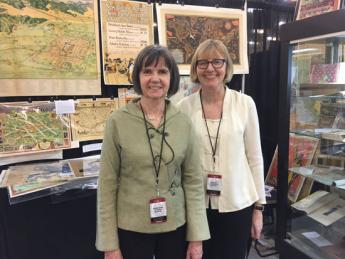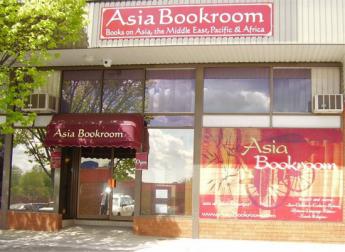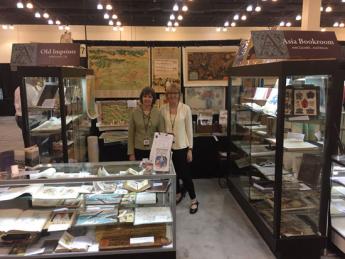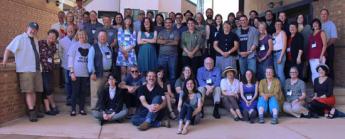Asia Bookroom
Interviewed by AbeBooks: "Sisters in antiquarian bookselling: meet Elisabeth and Sally Burdon"

AbeBooks: How did you start in the book business?
Sally Burdon: I run the now much evolved, original business that our parents began in Canberra in the late 1960s. I joined the business in 1982 when I returned to Australia after a period of living in England and Ireland. Within six months we had opened a branch of the business and for over 10 years we ran the two shops together before combining them physically in one large premises in the early 1990s. My mother continued to work with me until her early 80s when she became too ill to continue. It was wonderful! We were fortunate to be very close, just as we both were with Elisabeth. My mother used to visit Elisabeth every year in the US and together they did many buying trips around the then many bookshops of the Pacific Northwest. I also occasionally visited Elisabeth and we shared many ideas and ways of working. We were always sorry Elisabeth couldn’t work with us on a day-to-day basis but this regular contact and our mother’s annual visits made her feel much closer in those pre-email, pre-Skype days when international phone calls were very expensive.
Elisabeth Burdon: Serendipity…Sally and I were brought up in a “first generation” bookselling family. Our mother and father, world travellers who had recently settled in Australia, were collectors who became sellers. Sally and I were both young enough at that time to become involved in helping out in the shop and accompanying our fledgling dealer parents in their book-buying travels. That included my being the driver on a buying trip my parents embarked on in England in the mid-1970s when I was living in London and working at the British Museum. The temptation to become more personally involved in the business was only revived after I moved to the US with no immediate career path and an American husband with a penchant for antiques, who was easily persuaded by the idea of a business dealing in antique paper.

AbeBooks: Do you ever encounter other pairs of sisters in this business?
Sally Burdon: It is surprising how rare it is to find sisters in the book business, although I occasionally see or hear of sisters working together in other businesses. I don’t know of any in the antiquarian book business.
Elisabeth Burdon: No, the relationship certainly peaks the interest of customers when we are sharing a booth at a book fair – plus the fact that we live on opposite sides of the world. Fortunately our specialties mesh well, making for a striking display with diversity of topics covered. But the family story doesn’t end with the two of us – our brother Jonathan Burdon (Pilgrim Books) and sister-in-law Kay Craddock (whose storied bookshop is a Melbourne, Australia, fixture) are also antiquarian booksellers. Our other two siblings are both book collectors, so it’s evidently in the blood.
(Editor’s note – Since this interview was published, we have heard more about sisters in antiquarian bookselling. In Paris, sisters Camille and Amélie Sourget have separate bookshops on Rue de Seine and Rue de l’Odéon respectively. In Madrid, Belén and Alicia Bardón are the bookselling granddaughters of Luis Bardón López who founded Librería Bardón.)
AbeBooks: @Elisabeth, you offer a great deal of prints, maps and ephemera. Why go in that direction?
Elisabeth Burdon: I’ve always been interested in the power of graphics to communicate, an interest that was developed while at university using graphic material in the study of Japanese history. That theme of investigating history through graphic sources has been the through line of a career that has seen shifts in the focus of my stock but has always emphasized non-book printed material. It’s rewarding to look at ephemeral material and provide a context for its significance in historical research, particularly relating to the strata of society not well represented in antiquarian books per se.
AbeBooks: @Sally, you specializes in Asia. Why?
Sally Burdon: The specialization in Asia was begun by our parents. In the years prior to their move to Australia they had traveled and lived in a number of countries in Asia. These experiences gave them a life-long interest in the Asian region which I have inherited. However my interest in the region is a great deal more than a passive interest gained from just talking to my parents. My husband and I travel in the region and actively study the history and cultures of the area, as well as studying Chinese for fun. Living in Australia, which is geographically close to Asia and has a growing population of people whose family background is Asian, is another motivation. I sometimes think how surprising it is that more booksellers don’t carry strong Asian sections. It is just such an interesting part of the world, so diverse, so rich in every sense that one could never be bored specializing in books, ephemera and other materials on Asia.
Developing our business into Asia Bookroom – a business that is devoted entirely to Asian material rather than a general book business with a specialization in Asia – was a leap of faith. I feel so lucky to have been a bookseller at the time of the huge change that the Internet brought into all of our lives which was what made it possible. Location of the business, in other words who was walking past the door, was no longer the most important factor which meant that at the beginning of the 2000s my mother and I were able to make the decision to sell off all of the non-Asia stock we held and focus entirely on our specialization. Although appearing risky at the time, it has turned out to be a fortunate decision which has proved successful in all the different ways success can be counted.

AbeBooks: Major book fairs and map fairs bring you together. What do you talk about when you are reunited?
Sally Burdon: Definitely not all business! Naturally we share an interest in the activities of our family members but we also discuss by the hour our reactions to things and our many joint interests such as Asian philosophies, films, books and anything else we can think of! However as this business is such a passion and like most who are involved we live and breathe it, we certainly do talk about business a lot and have helped each other greatly over the years by being always there and always offering an understanding non-judgemental sounding board for the other.
Elisabeth Burdon: In our digitized world, fairs not only play the role of bringing dealers and buyers together, but also the important role of bringing booksellers together, fostering a global bookseller community – and the two of us certainly like to take advantage of that opportunity! The sense of making far-flung connections was particularly noticeable (despite the language barrier) at March’s Tokyo Antiquarian Book Fair that Sally and I exhibited at, and it is an important part of the role of the International League of Antiquarian Booksellers (as Sally commented on in her brief address at the Exhibitor Reception, the video of which has been posted on ILAB). It goes without saying that the same socializing and exchanging of information goes on between sisters.
AbeBooks: What changes would encourage more women into the business?
Sally Burdon: It is difficult to give a short answer to what I believe is a deeply tangled cultural issue. In short there are many changes I would like to see, but most are subtle and stem from the need for acceptance, support and for good role models. I don’t believe the reason for the large gender imbalance in the trade is as simple as men excluding women – these days I see little evidence of that. Rather it is about ensuring that women are valued and respected in all areas of the trade. There is no doubt things have changed enormously for women in the antiquarian book trade since I first joined in my early 20s but equally there is still need for change. It is very good to see national associations such as the ABAA and ABA have led the way by enshrining codes of behaviour which include gender equality in their rules. It is also great to see the work of the ABAA Women’s Initiative and the ABA’s social events for women booksellers taking place. There is also an active Facebook page for women in rare books. Awareness is a large part of changing behaviours and these initiatives encourage discussion and a much broader awareness of the ways in which women may have felt excluded or inadequate.
Interestingly the balance is more in favor of women, depending on the country, in the new book trade and the library world, both of which are related areas of work so it is certainly not because women are not drawn to books and to the old and rare! The work that the Colorado Antiquarian Book Seminar (CABS, see last year’s students and faculty pictured below) and the York Antiquarian Book Seminar (YABS) do in supporting women and men coming into the trade is another significant help, as is the ILAB International Mentoring Programme which offers support to those in their early years of trading, again, this is open to both men and women. These programmes while not designed specifically for women give the women who undertake them networks and the much needed confidence to progress quickly and confidently in the trade.

Elisabeth Burdon: Those changes involve so much more than the book business, but heightened awareness and support are a good place to start. I am grateful to a number of groups who have taken up this issue, including the ABAA Women’s Initiative, a place to allow for discussion of the challenges women may face not only as they start out but also as they become more established in their careers. Other important programs include CABS and YABS, the California Rare Book School and the ILAB mentoring program – organizations open to all, which provide training in bookselling as a business and encourage networking.
On a positive note the current President of the ILAB is a woman (that’s Sally). However she is only the second woman to hold the position (after Kay Craddock, 2000-2002) in this organization which was founded in 1948….
AbeBooks: There does seem to be a new generation of female booksellers coming through – which ones have caught your eye?
Sally Burdon: Yes there are many and since I can’t list all of them here I wanted to mention those who stood out particularly at February’s ILAB Congressin Pasadena. Of the four scholarships to attend the Congress that the ABAA so generously gave, three were to women. And what an inspiring group these three were! Canadian Aimee Peake (pictured right, Bison Books in Winnipeg), Australian Dawn Albinger (Archives Fine Books, Brisbane) and American Laura Massey (Alembic Rare Books, London) – each of these booksellers strike me as very impressive. They approach bookselling in an engaged and intelligent manner and you just know the future of bookselling is safe in the hands of people like this group of women. While speaking of outstanding young women booksellers I have to say how incredibly impressed I am with Congress co-organiser Jen Johnson of Johnson Rare Books & Archives – energetic, intelligent, hardworking, intelligent, funny and very, very good at what she does… with the future of the trade in the hands of women like Jen, Laura, Dawn and Aimee we have little to worry about!
Elisabeth Burdon: I’m loath to single out any of the talented women booksellers with whom I am personally acquainted. However I will mention two women whom I’ve recently interacted with and who are working in very different bookselling environments…. Rachelle Markley of Crooked House Books here in my home city of Portland Oregon has been the efficient and personable Rose City Book Fair convener of several years as well as a Cascade Booksellers Association Past President; while in Tokyo recently I had the pleasure of meeting the gifted bilingual Rose Counsell (working at Ryu Sato’s bookshop, Kagerou Bunko in Tokyo). In addition to their enthusiasm in developing their skills and knowledge both demonstrate a dedication to expanding the reach and inclusiveness of the book trade as a whole.
AbeBooks: Thanks for answering our questions. Happy bookselling
